

What Happens When We Become A Cashless Society? The U.S. government didn’t issue banknotes until 1862.
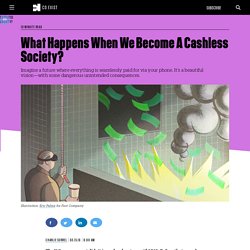
Before that, people paid for goods and services with a mix of government-minted coins and currencies issued by private banks. And now cash is on its way out, accounting for just 40% of payments in 2012 and dropping. There are many benefits to removing cash from the economy, such as eliminating black markets and allowing more easy monetary policy. Swedes Warned As Pimps & Prostitutes Use Airbnb Homes In Stockholm. According to police in Stockholm, pimps are using fake profiles to book apartments through Airbnb, then use the sublets for their prostitutes’ services.

Swedish police are now warning owners of apartments listed on Airbnb to beware, as a growing number of prostitutes entertain their clients in the privately owned homes. Simon Häggström is the head of the Stockholm police unit leading investigations in Stockholm, and he says prostitutes are currently active at approximately 200 addresses on any normal day in the city. While hotels were previously their accommodation of choice, Airbnb has now given them a great alternative. Häggström told the Swedish newspaper Dagens Nyheter that sublet apartments are now the “largest market for prostitution in Stockholm.”
Insurance, The Blockchain, and The Sharing Economy: Re-Imagining InsuranceTech with P2P Social… Insurance, The Blockchain, and The Sharing Economy: Re-Imagining InsuranceTech with P2P Social Insurance Networks on the Blockchain I never thought I would ever write a paper about Insurance, but it recently came up as an interest of mine, as I’ve found that the most interested, and interesting parties, in the blockchain ecosystem are the innovators in the Insurance industry.
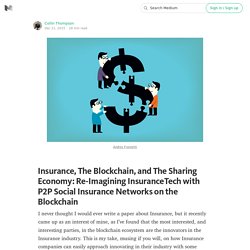
This is my take, musing if you will, on how Insurance companies can easily approach innovating in their industry with some exceptionally smart founders who are very willing to collaborate with the industry titans to solve some of the most interesting problems facing the developed and developing world. We all want to help one another. Human beings are like that. We want to live by each other’s happiness — not by each other’s misery. Insurance Origins “Friendly Societies” or “Collaborative Communities” was the original model of the insurance business.
Proposal of a dignity scale for sustainable governance - OxPol. In October 2005, two North African teenagers died of electrocution in one of the banlieues of Paris as they were running from the police through a dangerous power substation.

An inquiry later established the teens were innocent, and the incident sparked some of the worst unrest seen in France over the past 40 years. The riots brought about much debate over the tense relationship between immigrant youth and the state, the recurring problems of “fracture sociale,” and a perceived lack of social justice. Oscar Health : Google met un pied dans l'assurance santé. Google Capital vient d’investir 32,5 millions de dollars dans la startup de l’assurance santé Oscar Health, qui s’est notamment fait connaître aux Etats-Unis en offrant à ses adhérents des bracelets connectés et en les rémunérant s’ils atteignaient leur objectif d’activité physique.

Avec cet investissement, Alphabet poursuit donc son incursion dans la santé, en approchant le marché sous un nouvel angle : celui des financeurs du système de soins. Après plusieurs partenariats avec des laboratoires pharmaceutiques, le développement d’un tracker d’activité, l’enrichissement de ses pages de résultats avec des infos santé et des tests de service de téléconsultation médicale, Google s’intéresse maintenant de plus près au marché de l’assurance santé aux Etats-Unis en investissant dans une startup prometteuse : Oscar Health.
Oscar Health, ou l’expérience client de l’assurance santé revisitée par la Silicon Valley. The future of insurance. Charles-Edouard Vincent. « À l’heure où les grandes villes souffrent d’anonymat et sont de plus en plus touchées par l’exclusion, il est nécessaire de construire de nouveaux modèles plus inclusifs.

La start-up française Heetch au cœur du conflit avec les taxis. Depuis la fermeture d'UberPop, cette application destinée à transporter des jeunes la nuit est désormais pointée du doigt par les taxis et...Uber.
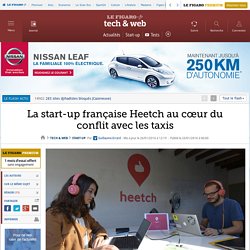
Pourtant, ses dirigeants se disent prêts à aider les taxis à se réformer. Vous avez appris à connaître Uber, vous allez désormais apprendre à connaître Heetch. Depuis la suppression du service UberPop, les projecteurs se sont braqués sur cette start-up française de 20 employés, créée en septembre 2013. C'est pourquoi les dirigeants de Heetch, qui revendique plus de 150.000 utilisateurs actifs (contre 400.000 pour Uber), a souhaité prendre la parole ce lundi. «Nous sommes très étonnés de nous retrouver au milieu d'un conflit opposant G7 et Uber, deux acteurs importants du secteur qui monopolisent la parole. Trying to get a grip on the gig economy - Equitable Growth. If headlines on websites and anecdotes from residents of major urban areas were evidence, the rising importance of the gig economy would be without doubt.
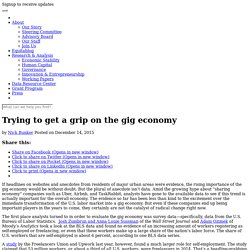
But the plural of anecdote isn’t data. Amid the growing hype about “sharing economy” companies such as Uber, Airbnb, and TaskRabbit, analysts have gone to the available data to see if this trend is actually important for the overall economy. The evidence so far has been less than kind to the excitement over the immediate transformation of the U.S. labor market into a gig economy. But even if these companies end up being important players in the years to come, they certainly are not the catalyst of radical change right now. Forbes Welcome. « L’économie collaborative accroît les inégalités patrimoniales » Rue89.nouvelobs. Platform capitalism and the post-job economy. TRACKS – i4j Eco Summit. A Shared Future, A Global Economy Of Haves And Servants. Editor’s note: Max Wolff is an economist and investment strategist who is the managing partner and chief economist at Manhattan Venture Partners.
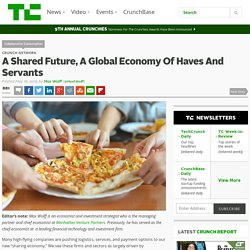
Previously, he has served as the chief economist at a leading financial technology and investment firm. Many high-flying companies are pushing logistics, services, and payment options to our new “sharing economy.” We see these firms and sectors as largely driven by macroeconomic trends. The Productivity Obsession. In a hotel room on a recent business trip, nestled next to the telephone on the work desk, a little cardboard sign beckoned: “Help us make your stay more productive.”
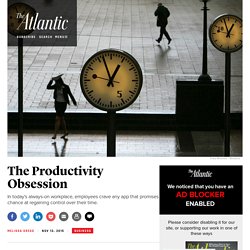
Not “restful” or “comfortable” but “productive.” In the hotel room as in the office, productivity increasingly stands as the default measure of accomplishment. The land of leisure. AS MOST Americans will tell you if you can stop them long enough to ask, working people in the United States are as busy as ever. Sure, technology and competition are boosting the economy; but nearly everyone thinks they have increased the demands on people at home and in the workplace. But is the overworked American a creature of myth? A pair of economists have looked closely at how Americans actually spend their time. Where’s our life of leisure? In their new book, How Much is Enough?
: The Love of Money and the Case for the Good Life, the British father-and-son team of Robert (political economist) and Edward (philosopher) Skidelsky cite the famous prediction made by John Maynard Keynes in 1930: Assuming that productivity levels would continue to rise, Keynes said, his grandchildren and great grandchildren would likely have to work only 15 hours a week. The rest would be leisure. Man, said Keynes, would then confront “his real, his permanent problem – how to use his freedom from pressing economic cares, how to occupy the leisure to live wisely and agreeably and well.”
Mouthbreathing Machiavellis Dream of a Silicon Reich. One day in March of this year, a Google engineer named Justine Tunney created a strange and ultimately doomed petition at the White House website. The petition proposed a three-point national referendum, as follows: 1. Retire all government employees with full pensions. 2. Crowdtiming : c'est l'heure de se mobiliser ! - ConsoCollaborative. Pas toujours facile de donner de son temps pour une cause dans nos vie surchargées. Fullmobs s'inspire du crowdfunding et invente le " crowdtiming ", en invitant chaque personne à se mobiliser à la hauteur de ses possibilités.
Suivez le mouvement ! « Les citoyens ont le pouvoir de faire changer les choses et de redessiner la société dans laquelle ils vivent, mais ils ne s’en rendent pas compte. Il suffit de passer à l’action ensemble pour que le monde et les mentalités changent. » Telles sont les paroles optimistes et encourageantes de deux jeunes femmes pleines de pep’s, qui ont co-fondé Fullmobs. Roxane Julien et Séverine Pelleray ont lancé cet outil collaboratif en mars 2015. Diversité des mobilisations. Banking disruption: Removing the friction. Reserve your seat for the O'Reilly Next:Money Summit, our new event exploring the long game of financial upheaval. Brett King is the founder and CEO of Moven, a fintech company offering what it describes as the world's first downloadable bank account. Bret Easton Ellis on Living in the Cult of Likability. Photo. Après les Gafa, les nouveaux maîtres du monde sont les Natu.
Le crowdfunding immobilier, comment ça marche? In U.S. driver lawsuit, Uber must live with class action order for now. Comment les « travailleurs 1099 » menacent l’Uber-économie. Dans la Silicon Valley, on les connaît sous l’appellation de "travailleurs 1099", en référence au formulaire fiscal qu’ils doivent remplir. Ils s’improvisent chauffeurs de taxis, arpentent les allées des supermarchés, font le ménage à domicile, livrent achats et repas… Et ils sont au cœur de tout un pan de la révolution numérique : l’économie à la demande, aussi surnommée l’économie des petits boulots ou encore l'Uber-économie. La société américaine de transport urbain a en effet bâti son modèle économique sur le recours à cette main d'oeuvre, dite indépendante. Amazon attaqué en justice par ses livreurs.
Après FedEx et Uber, c'est au tour d'Amazon. Mardi 27 octobre, quatre chauffeurs-livreurs du géant américain du e-commerce ont déposé une plainte devant un tribunal du comté de Los Angeles. Comme pour les autres procédures, les plaignants estiment qu'ils auraient dû être considérés comme des salariés et non comme des travailleurs indépendants. L'issue de ce dossier pourrait avoir des répercutions importantes pour la société, qui teste de nouveaux services pour livrer ses colis toujours plus vite. Les quatre chauffeurs travaillaient pour le service Amazon Prime Now, qui propose des livraisons en une ou deux heures. Full-time workers vs. the 'gig economy': Why have employees at all? When I first met Andrew Berlin at a Stanford executive program in the early 1990s, Berlin Packaging was a small enterprise doing maybe $40 million in sales in what was then, and still is, a very tough, almost commodity-like industry.
Today, the packaging company brings in close to $1 billion in annual revenues, Andrew Berlin has an ownership interest in the Chicago Cubs and a World Series ring from his past ownership interest in the White Sox, and he runs a company growing earnings at a low double-digit rate that achieves good margins. Andrew Berlin has made a fortune by building a competitive advantage through his company’s culture and his people. Having recently joined Berlin’s board, I could anticipate Andrew’s answer to my question, “why have employees?” Rue89.nouvelobs. Guilds and the Future of Work. One afternoon in May, Chris Chavez, Jerone Hsu, and Dan Taeyoung splayed themselves out along a suspended I-beam and stray ladder on the roof of a pair of conjoined buildings on the Hell’s Kitchen end of Fifty-fourth Street, talking about their co-working collective, Prime Produce, and the history of the world.
The three entrepreneurs, who are in their late twenties and early thirties, were overseeing a total renovation of the structure beneath them. First built in 1919 as a garage, it was being transformed to include an art studio in the basement, an open-plan office and café at the ground level, and a room for workshops and meditation on the second floor. Chavez greeted construction workers by name as they passed by. The three men began to tell me where they situated their plans, world-historically speaking. Et si les chauffeurs Uber clonaient le système pour reprendre leur liberté ? Après les Gafa, les nouveaux maîtres du monde sont les Natu.
What is the sharing economy? Platform Cooperativism vs. the Sharing Economy — Digital Labor. The backlash against unethical labor practices in the “collaborative sharing economy” has been overplayed. The Shiny New "Sharing Economy" Is Sure Starting to Seem Awfully Old-Fashioned.